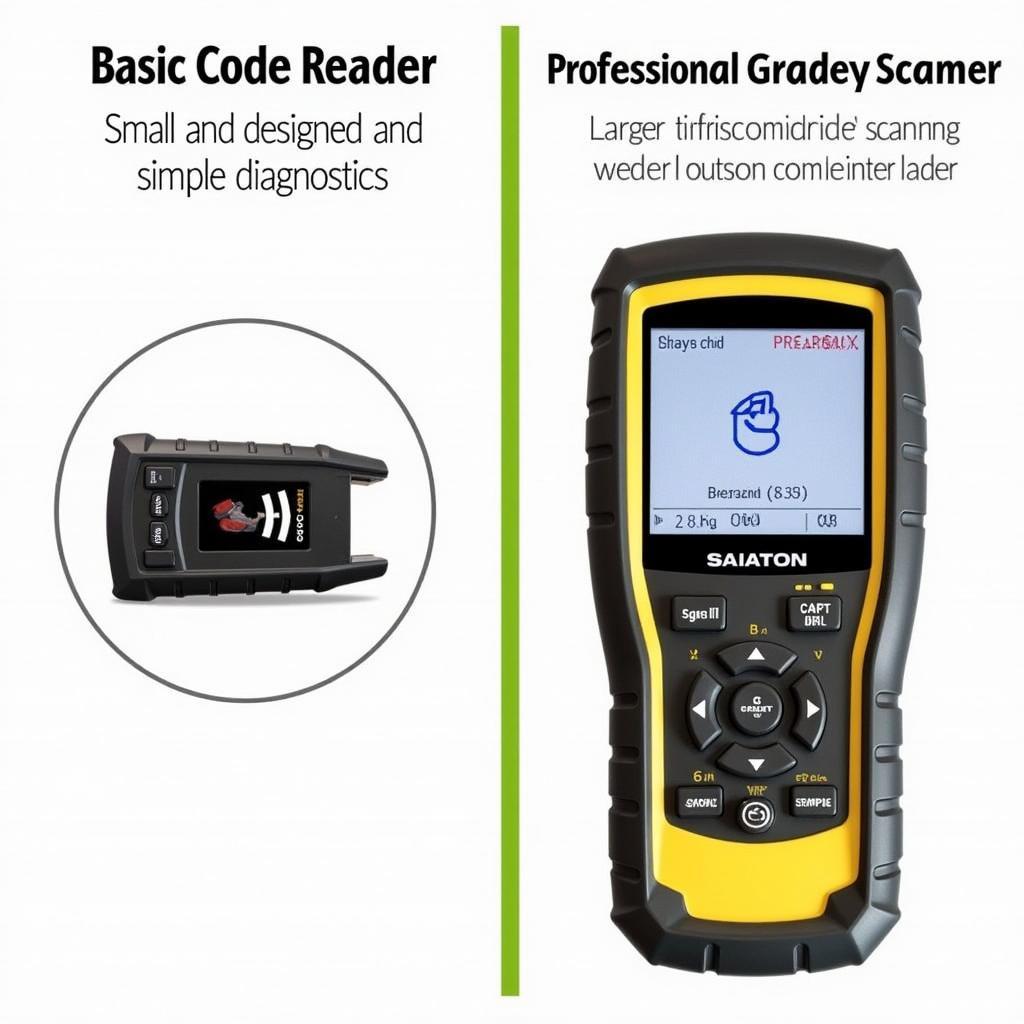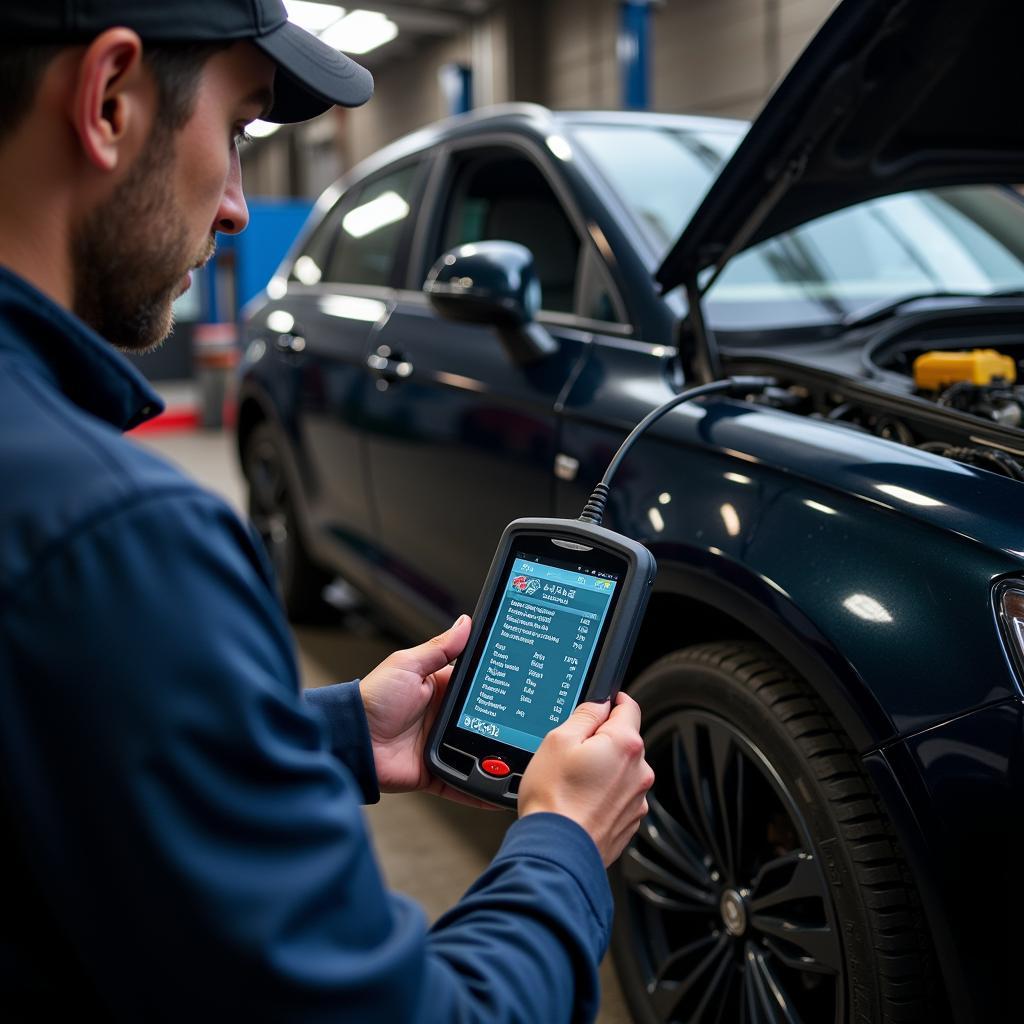Navigating the world of car diagnostics can feel like trying to decipher ancient hieroglyphics. Whether you’re a seasoned mechanic or a car enthusiast looking to demystify those pesky dashboard lights, having The Best Car Diagnostic Machine can be a game-changer. But with a market flooded with options, finding the perfect tool for your needs can feel overwhelming. Don’t worry, we’re here to break it down for you. This comprehensive guide will equip you with the knowledge to confidently choose the ideal diagnostic machine for your needs.
Understanding Your Needs: The First Step to Finding the Best Diagnostic Machine for Cars
Before diving into the world of diagnostic scanners, it’s crucial to define your specific requirements. Are you a DIY enthusiast wanting to troubleshoot basic engine codes or a professional mechanic dealing with complex module programming?
 Basic Code Reader vs Professional Scanner
Basic Code Reader vs Professional Scanner
Consider the following factors:
- Vehicle Coverage: Ensure the machine supports the make, model, and year of your vehicle(s). Some scanners specialize in specific manufacturers, while others offer broader compatibility.
- Diagnostic Depth: Determine the level of detail you require. Do you need basic code reading capabilities, or are you looking for advanced functions like bi-directional control, live data streaming, and module coding?
- User Friendliness: Opt for a user interface that aligns with your technical expertise. Intuitive designs, multilingual support, and clear instructions can significantly enhance usability.
- Budget: Diagnostic machines range from affordable handheld devices to high-end professional systems. Establish a realistic budget to narrow your search.
Types of Car Diagnostic Machines: From Basic to Advanced
The market offers a diverse range of car diagnostic machines, each catering to different needs and expertise levels. Here’s a breakdown of the most common types:
1. Code Readers:
- Functionality: As the name suggests, these entry-level devices primarily read and clear basic diagnostic trouble codes (DTCs).
- Ideal for: Car owners seeking a quick and easy way to understand the “check engine” light.
- Pros: Affordable, portable, and user-friendly.
- Cons: Limited functionality, may not provide in-depth code definitions.
2. OBD2 Scanners:
- Functionality: These scanners offer a step up from basic code readers, providing more detailed code definitions, live data parameters, and some may include additional features like freeze frame data and emissions readiness checks.
- Ideal for: DIY enthusiasts and those who perform basic car maintenance.
- Pros: Affordable, relatively user-friendly, offer more information than basic code readers.
- Cons: Limited advanced features, may not support all vehicle systems.
3. Professional-Grade Scanners:
- Functionality: These comprehensive tools provide advanced diagnostics, including bi-directional control, module coding, key programming, and access to manufacturer-specific systems.
- Ideal for: Professional mechanics and automotive technicians.
- Pros: Extensive functionality, detailed diagnostics, access to a wide range of vehicle systems.
- Cons: Can be expensive, require a higher level of technical expertise.
 Mechanic Using a Professional Diagnostic Scanner
Mechanic Using a Professional Diagnostic Scanner
Key Features to Consider: Unlocking the Full Potential of Your Diagnostic Machine
When choosing a car diagnostic machine, several key features can significantly impact its functionality and ease of use:
- Live Data Streaming: This feature allows you to monitor real-time sensor data, providing valuable insights into your vehicle’s performance and potential issues.
- Bi-Directional Control: Also known as “Active Tests,” this feature enables you to interact with vehicle systems, such as turning components on and off, to diagnose complex problems effectively.
- Module Coding & Programming: This advanced feature allows for customization and reprogramming of various vehicle modules, a task typically reserved for professional mechanics.
- ECU Flashing: This feature enables you to update a vehicle’s engine control unit (ECU) software, often requiring specialized knowledge and tools.
- Wireless Connectivity: Bluetooth or Wi-Fi connectivity allows for seamless data transfer and remote access to diagnostic information.
Top Tips for Choosing the Best Diagnostic Machine for All Cars
Finding the perfect diagnostic machine requires careful consideration of your needs and a thorough evaluation of available options. Here are some expert tips to guide your decision:
- Research Extensively: Explore reputable online resources, read user reviews, and compare different models and brands before making a purchase.
- Consider Future Needs: Anticipate your future diagnostic needs. Investing in a more advanced machine with features you may need down the line can save you money in the long run.
- Prioritize User Experience: Look for scanners with intuitive interfaces, clear navigation menus, and readily available customer support.
- Check for Software Updates: Regular software updates are crucial for maintaining compatibility with the latest vehicle models and ensuring optimal performance.
Frequently Asked Questions About Car Diagnostic Machines
Q: What does “OBD2 compliant” mean?
A: OBD2 (On-Board Diagnostics II) is a standardized system used in most vehicles manufactured after 1996. A diagnostic machine that’s OBD2 compliant can communicate with and retrieve data from these vehicles.
Q: Can I use a car diagnostic machine on any car?
A: While many diagnostic machines offer broad vehicle coverage, it’s essential to verify compatibility with the specific make, model, and year of your car before purchasing.
Q: Do I need a professional-grade scanner for DIY car maintenance?
A: Not necessarily. While professional-grade scanners offer extensive functionality, an OBD2 scanner or a code reader with live data capabilities can be sufficient for many DIY tasks.
Need Help Choosing the Right Diagnostic Machine?
Choosing the best car diagnostic machine is an investment in your vehicle’s health and your peace of mind. By understanding your needs, exploring different types of scanners, and considering key features, you can make an informed decision that empowers you to take control of your car’s diagnostics. Remember, the right diagnostic machine can be a powerful tool for both professional mechanics and car enthusiasts alike.
Still unsure which machine is right for you? Contact us on WhatsApp: +1(641)206-8880, or email us at [email protected]. We have a 24/7 customer support team ready to assist you!

Leave a Reply